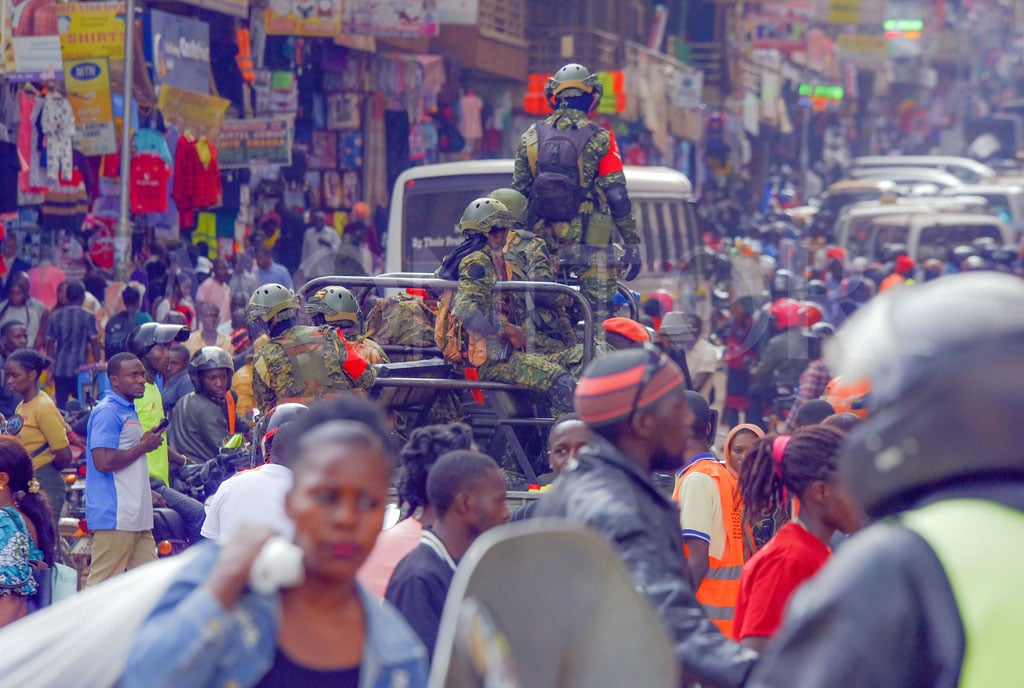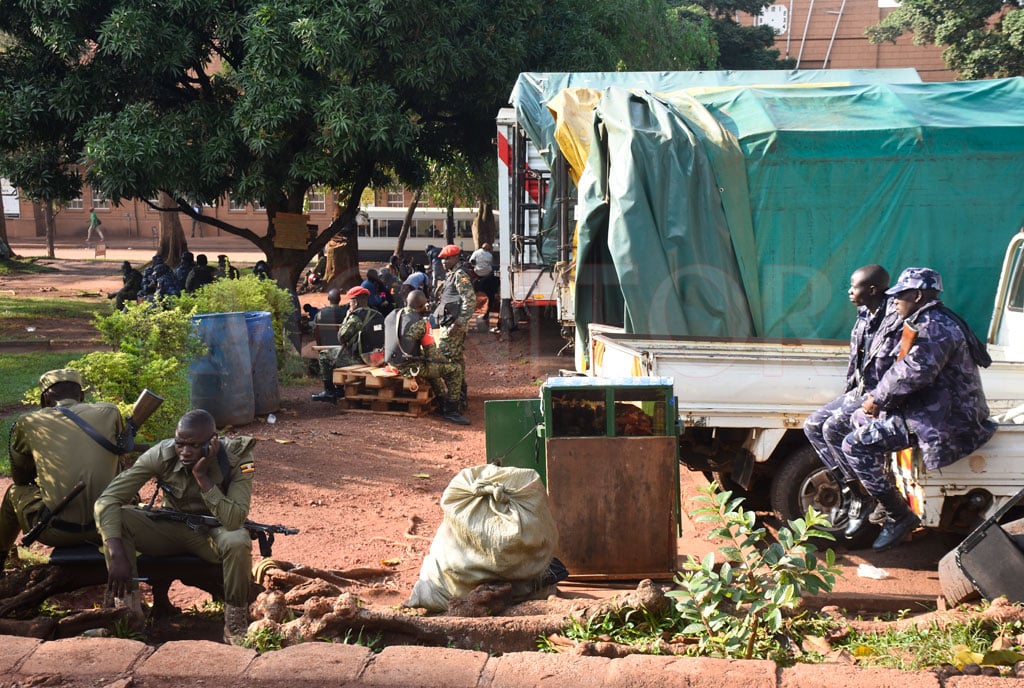
Protesters carry placards as they chant slogans against corruption on Nasser Road in Kampala yesterday. PHOTO/ ISAAC KASAMANI
Members of Parliament, activists, and experts have proposed various strategies to combat and end corruption in the country.
These strategies include eliminating classified budgets, demonstrating exemplary leadership, ensuring total political will and commitment to fighting corruption, and digitising service delivery to minimise human contact.
They also recommended dialogue between the government and anti-corruption crusaders, stopping the commercialisation of politics, reducing the cost of administration, and instilling an anti-corruption culture among state officials.
These propositions come in response to increasing public outcries against corruption. On Tuesday, youths attempted to march to Parliament to protest alleged corruption in the institution.
Kampala City was placed under tight military watch, with armed personnel spread across the city to suppress the protests. More than 50 youth, including three of their four key leaders, were arrested and charged with being a public nuisance.
Intense scrutiny of the House continues, including an exhibition under the hashtag #UgandaParliamentExhibition on the micro-blogging site X (formerly Twitter), which highlighted alleged gross maladministration and extravagant spending by the 11th Parliament.
Citizens, including journalist and lawyer Agather Atuhaire and the university don and satirist, Prof Jimmy Spire Ssentongo, led the drive. However, Speaker Among has dismissed it as a political witch-hunt.
Dr Kizza Besigye, a four-time presidential candidate, supported the youth’s approach, describing it as a positive step. Dr Besigye posted on X: “The task is to break through the CORRUPTION SHIELD of the NRM/M7 Junta/mafia! It may not happen in one or two days; the pressure must be maintained until the shield comes down - for good! Painful, but progress; good so far.”
Officials from the Inspectorate of Government (IG) and the State House Anti-Corruption Unit encouraged the public to be vigilant about their leaders’ actions in government ministries, departments, and agencies.
They urged the public to share information and evidence on any corrupt officials to enable immediate action.
Ms Ali Munira, the spokesperson for the IG, emphasised the importance of information sharing: “As IG, we shall take action. Remember, we cannot be everywhere, so the public has a huge role to play in this fight.”
Ms Mariam Natasha Oduka, her counterpart from the State House Anti-Corruption Unit, advised: “Report any suspected corrupt person to the government agency. We have toll-free lines, WhatsApp, and emails you can use to report. Follow up with your leaders and know what they are doing.”
In an interview, the executive director of the Anti-Corruption Coalition Uganda (ACCU), Mr Marlon Agaba, warned that without political will, it will take decades to eradicate corruption.
“If the leaders are going after small corruption cases and leaving the high-profile political cases, corruption will not end. You saw the president calling the public to fight corruption, but he is simultaneously shielding those who are corrupt. This is the start of all problems,” he said.
Mr Agaba’s views echo those of Ms Miria Matembe, the former Ethics Minister, who accused President Museveni of shielding corrupt officials.
Ms Matembe also criticised the President for duplicating duties, questioning why he hires ministers to advise him while also employing RDCs and presidential advisors, who consume government funds that could be used to create more jobs for youths.
“Most people in this country keep themselves in power through corruption, so they cannot cut the ladder that took them there. The youths are tired and are being killed in Arab countries because old people are not leaving their jobs. Where should they go? This is their generation,” she said.
Mr Muwanga Kivumbi, the chairperson of the House Public Accounts Committee, emphasised that only exemplary leadership, particularly from President Museveni, can effectively combat corruption.
He criticised the President for appointing ministers such as Amos Lugoloobi, who have been charged with corruption, suggesting that such individuals should step aside.
Mr Kivumbi also highlighted the contradiction in arresting those who demonstrate against corruption instead of engaging with them.
He suggested that President Museveni invite the youths to Kololo Ceremonial Grounds in Kampala to hear their concerns. Mr Kivumbi pointed out the issue of classified budgets, where large sums of money are hidden, as a significant barrier to eradicating corruption.
He questioned the president’s lack of trust in existing institutions like the IG, evidenced by the creation of an anti-corruption unit within the State House.
“We need exemplary leadership by President Museveni because small statements can make a big difference. What justification does he have for appointing a minister in his Cabinet who has been charged in court over corruption?” he said.
The 2021 report by the IG indicated that Uganda loses Shs9.1 trillion to corruption annually. Speaking at the 12th CPA Economic recently, the Inspector General of Government, Ms Beti Olive Kamya, said the money is stolen through taxation, including non-declaration, under-declaration, and falsification of information.
She also mentioned losses through procurement by over-pricing goods, buying poor-quality goods at premium prices, under-delivery, air-purchase, poor-quality work, unfinished contracts, awarding contracts to undeserving suppliers, leaving out competent suppliers, and kickbacks.
“Uganda’s domestic revenue for FY 2022/2023 was Shs25.55 trillion, but Shs10 trillion was siphoned. So, the Shs10 trillion we lost to corruption in that financial year is equivalent to 40 percent of all the money we collected in taxes. We borrowed Shs27.2 trillion to raise our national budget to Shs52.7 trillion when all we needed to borrow was Shs17 trillion instead of Shs27 trillion. If we continue this trend and do nothing about it, it will get worse,” she said.
Mr Julius Mukunda, the executive director of the Civil Society Budget Advocacy Group (CSBAG), accused the government of shielding corruption by not allowing citizens to speak out and protest against it.
“We can do better in fighting corruption. When the government does not respond to the cries of the people, it creates room for disgruntlement, which, if not handled well, culminates in protests,” he said.
“Arresting youths is wrong. The government should look forward to sitting with the youth and anybody against corruption to address the issue. In the eyes of the public, the government is shielding corruption because it does not want people to talk about it,” he added.
Key strategies
1. Total political will and commitment to fighting corruption.
2. Clear service delivery standards through digitising services to minimise human contact.
3. The government should engage in dialogue with youths and anti-corruption citizens.
4. Stop monetising elections and politics.
5. Reduce the number of ministers, RDCs, and presidential advisors to avoid duplication of duties.
6. Instill a culture of anti-corruption among officials, as corruption is currently seen as normal.
7. Sharing information on corruption with the Inspectorate of Government
8. Eliminating classified budget.
9. Exemplary leadership.
10. Demonstrations.








